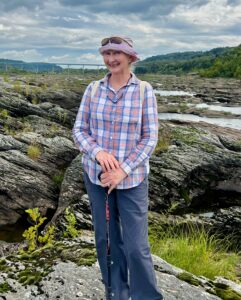100th Annual Meeting of the Pennsylvania Academy of Science Keynote Address
Saturday April 12, 2025 | Hilton Hotel
Unearthing Earth’s past, envisioning its future:
Rewilding landscapes to improve waterways and aquatic ecosystems
Dr. Dorothy Merritts, Ph.D.
Franklin & Marshall College
After two decades of studying impaired waterways in the mid-Atlantic region, our research group at Franklin and Marshall College established the Chesapeake Watershed Initiative in 2020 to deepen understanding of 1) the legacies of human impacts on riparian-aquatic ecosystems and 2) the impact of transformative restoration efforts to improve water quality and ecosystem health. Our approach connects landscape history and trajectories to current place-based restoration and applies to many human-impacted geographies worldwide. In this presentation, I’ll draw upon our work at CWI to discuss how “unearthing Earth’s past” enables us to envision restoration potential and guide restoration approaches.
Dorothy Merritts (B.Sc. Indiana University of Pennsylvania, M.Sc. Stanford University, Ph.D. University of Arizona) is a geologist with expertise in streams, rivers, and other landforms and on the impact of geologic processes, climate change, and human activities on the form and history of Earth’s surface. Her primary research in the eastern United States is in the Appalachian mid-Atlantic region, where she is investigating the role of human activities in transforming the upland woodlands and valley bottom wetland meadows of Eastern North America to a predominantly agricultural and mixed-industrial/urban landscape since European settlement. Associated with this work is the development of new wetland, floodplain, and stream restoration methods that rely upon geomorphic investigation. She uses lidar and other remote sensing data to map geomorphic evidence for continuous permafrost during the last glacial maximum period throughout Pennsylvania and Maryland. In the western United States, she researched the northern San Andreas Fault of coastal California for two decades; her international work focused on fault movements in South Korea, Indonesia, Australia, and Costa Rica. She is a Department of Earth and Environment professor at Franklin & Marshall College in Lancaster, Pennsylvania. From 2004 to 2005, she was the Flora Stone Mather Visiting Distinguished Professor at Case Western Reserve University in Cleveland, Ohio. From 2011 to 2012, she was the Alan Cox Visiting Professor at Stanford University. She is the author of an introductory textbook in environmental geology, numerous scientific papers, and edited book chapters, and she is a contributing author to five National Research Council reports. She was elected to the National Academy of Sciences in 2022.
